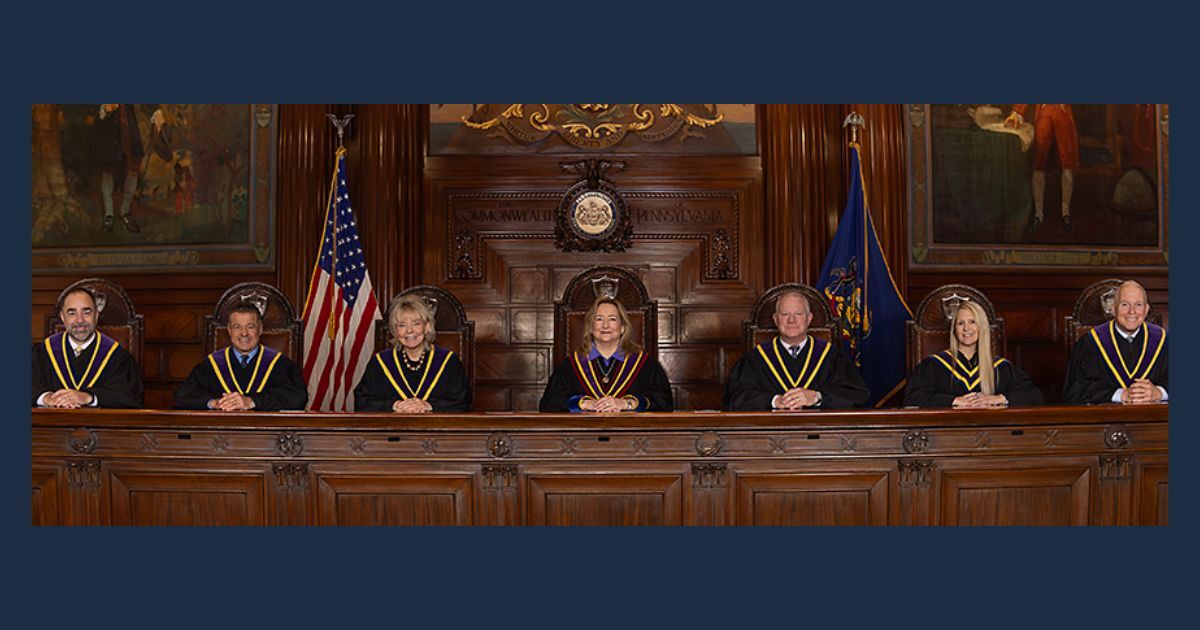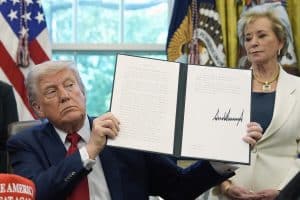Made up of seven justices, Pennsylvania’s state Supreme Court currently holds a Democratic 5-2 majority, which could change in November’s election.
It’s been a decade since a Democratic majority took control of the commonwealth’s highest court in 2005; making this year’s election outcome a watershed moment.
Pennsylvania Supreme Court Justices and Democrats Christine Donohue, Kevin Dougherty and David Wecht are up for retention vote with a yes/no ballot question in November.
What’s at stake is the potential for gerrymandered redistricting maps, the ability for women to access appropriate reproductive health care and a clear message to those seeking financial gain and influence here that Pennsylvanians are not interested in being controlled by out of state election campaign spending.
A virtual press call held earlier this month with representatives from Philadelphia law firm Kline & Specter, P.C., Planned Parenthood Votes and New Pennsylvania Project explored the potential impacts of November’s election outcomes in Pennsylvania across the nation.
“If these three justices are defeated, there will be bedlam in Pennsylvania because we will have only four justices on the Pennsylvania Supreme Court for as long as it takes to replace those justices, and that could be as long as two years,” said Shanin Specter, a founding partner of Philadelphia law firm Kline & Specter, P.C., and son of the late U.S. Sen. Arlen Specter.
Gov. Josh Shapiro, a Democrat, can select temporary justices to fill out the 10 year terms until the next election cycle; however his picks for justices must be approved by states’ current Republican controlled senate.
Pennsylvania’s courts do not generally play a role in determining voting districts – unless there is a stalemate in the legislature.
CNN reported on Sept. 18 that the new Texas redistricting map all but silences Democrats in the Lone Star state, with the object of the newly created maps set to carve out as many Republican leaning districts as possible ahead of next year’s midterm elections – as requested by President Trump.
In response to the Texas redistricting scheme, California has proposed its own Democrat-led redistricting map.
“The California ballot measure that will ask voters whether they approve a new congressional map created by Democrats, temporarily working around the state’s independent redistricting commission, specifically mentions Texas Republicans’ new districts in the measure’s title. It’s a sign of how unique this ballot push is,” NPR reported September 13.
Kadida Kenner, founding CEO of New Pennsylvania Project and the co-chair of Why Courts Matter, said Pennsylvania’s courts are pivotal to ensure voter rights, integrity and freedoms.
READ: How Pennsylvania Judges Facing Retention Ruled on Key Election Cases
“Pennsylvania’s laws and the ability to cast provisional ballots, mail in ballots and voter accessibility” comes from our courts, and the Pennsylvania Supreme Court has played a defining role “in ensuring our votes matter, and that they count,” Kenner said.
According to the Pennsylvanians for Modern Courts, the commonwealth is among “a handful of states” nationwide that elects its judges through partisan elections. Seven justices sit on Pennsylvania’s Supreme Court for 10 year terms, which are either renewed by retention ballot questions or general partisan elections for vacancies.
State Court Report said court judges are not confined by term limits; though a mandatory retirement age is set at 75.
This election’s Yes/No ballot question could make the difference between a full and functioning state supreme court for the next two years – and a potentially deadlocked court where business grinds to a halt.
If the current justices fail to be retained, their seats – whether they are filled temporarily by Shapiro and approved by the senate or not – those vacancies would be up for a general partisan election in 2027.
The non-partisan Pennsylvania Bar Association recommends all three Supreme Court justices for retention, along with other lower court officials up for retention this year, according to Specter.
“I know the Republican State Committee opposes the retention of these three justices. They have not performed their functions as Democrats. They have performed their functions as independent jurists. These three justices have been excellent justices. They have been fair; they have been impartial,” Specter said.
According to Nicole Chung, regional campaigns director at Planned Parenthood Votes, the stakes for women’s health rights could not be higher.
“The outcome of this election could shift the balance of power in this court and jeopardize [reproductive rights] freedoms for millions of people,” Chung said.
While 19 states currently have abortion bans in place, Chung said “there are politicians in Pennsylvania actively threatening to take away those rights in this state as well … the fight for reproductive freedom rests with these courts.”
Justices Donohue, Dougherty and Wecht previously ruled in favor of Pennsylvania’s reproductive rights providers, Chung said.
“The ruling in Pennsylvania was a monumental victory in the fight for reproductive freedom, but it was a victory by a single vote – [and] losing even one of these justices could put Pennsylvanians’ rights at risk,” Chung said.
READ: Democratic-Backed Group’s Ads for Pa. Supreme Court Retention Elections
Specter is concerned “out of state billionaires” could gain a stronghold in Pennsylvania and directly impact not only legislative initiatives but how the commonwealth conducts business in the future and its legal direction.
“I’m concerned about the suggestion … we’re going to have billionaires seek to control our courts and that they’re going to put a ton of money into this race to seek to defeat the retention of these three justices. Those folks have their agenda … it tends to be a hard right agenda inconsistent with the interests of Pennsylvanians,” Specter explained
He cited cases like Uber’s attempts to advance their business interests in states like California over its labor laws, and Elon Musk’s attempt to impact Wisconsin’s recent election judicial outcomes.
According to Specter, Musk poured money into Wisconsin’s judicial race in May to influence how automobiles are sold in the state – to his own advantage.
Wisconsin currently mandates automotive manufacturers are required to sell their products through vehicle dealerships. Musk sought to change that law to sell his products directly to consumers, according to Spector.
“I’m concerned about the suggestion … we’re going to have billionaires seek to control our courts … My concern is this election should be decided by Pennsylvanians – not by Texans, not by Californians but by Pennsylvanians – and it is very worrisome,” Specter added.





